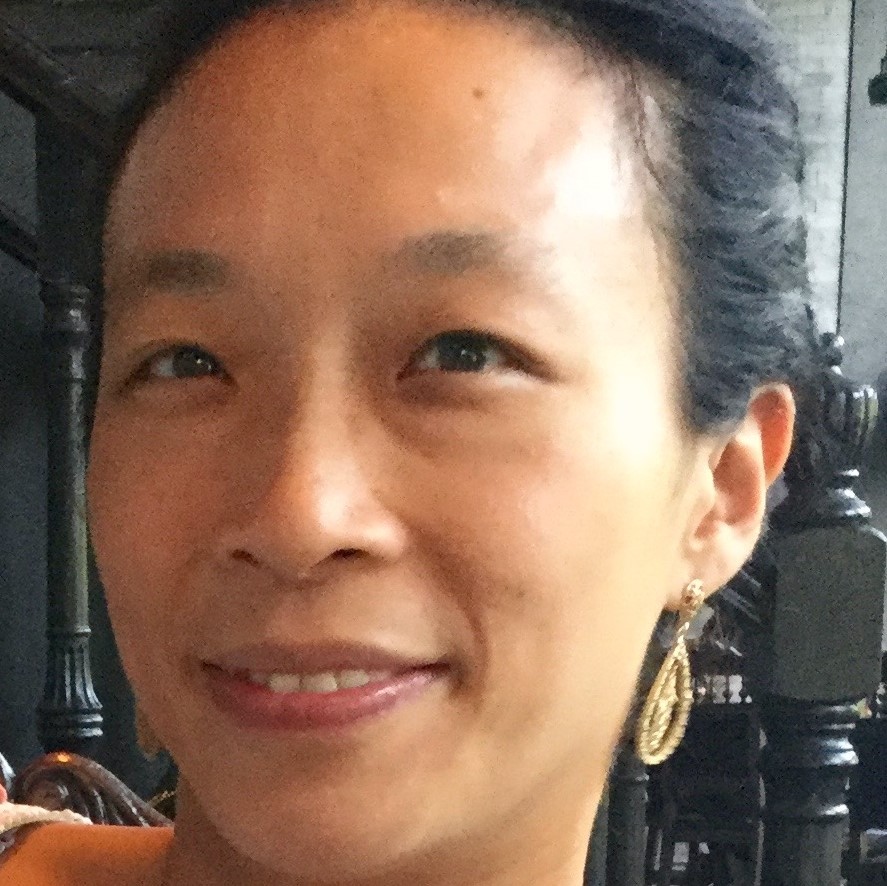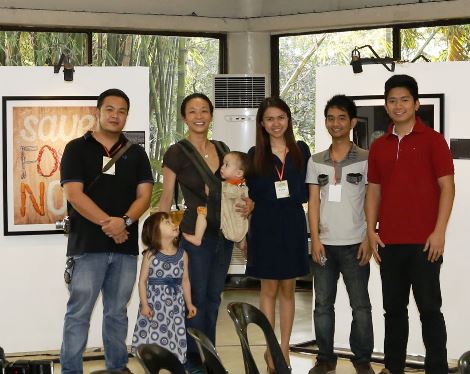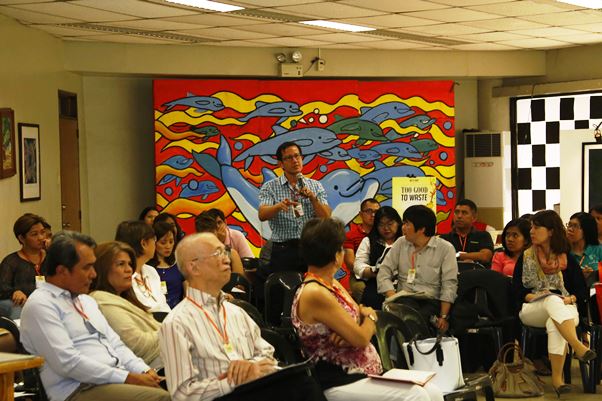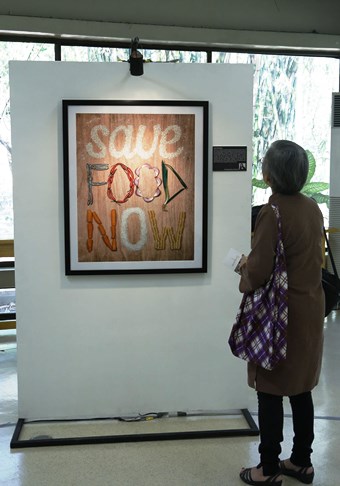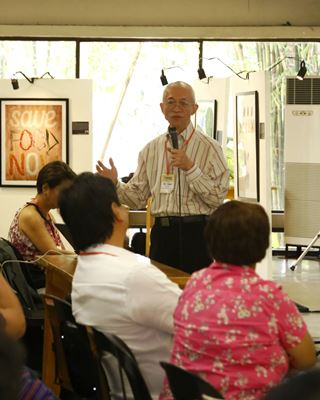Voices from the Sylff Community
Mar 18, 2015
Between 2:00 and 4:00 pm: How a Full-Time Mother Organized a Food-Bank Symposium
Sherilyn Siy Tan, a Sylff fellow who completed her master’s at Ateneo de Manila University in 2007, used an SLI award to organize a highly successful community conference to promote food donations and improve food security for those in need in the Philippines. Called “Our Community, Our Resources: Increasing Food Security,” the first food bank symposium in the country featured prominent speakers from civil society, industry, and government and examined such issues as food loss, logistical considerations in recovering and redistributing food, and increasing transparency and accountability. In this report, she recounts how she managed to overcome the challenges of organizing this major event while also working as a full-time mother of two young children.
* * *
Every so often, we read about the successful projects and achievements of Sylff fellows, and sometimes, instead of feeling inspired, we feel discouraged. We say, “That’s great, but that’s them, not me,” or “I wonder how they did that?” In this article, I share the “how to” of putting a symposium together while working in two different countries and coping with the unique set of challenges I faced as a full-time mother of two (aged 2 and 4). The first Philippine food bank symposium, entitled “Our Community, Our Resources: Increasing Food Security,” was held on March 22, 2014, at Miriam College, Quezon City, Philippines. There were about 100 participants and a powerhouse line-up of speakers that included government, nonprofit, and industry leaders.
Being a full-time mother is probably one of the busiest jobs in the world. Renowned psychologists and marital experts Dr. John M. Gottman and Dr. Julie Schwartz Gottman drafted a comprehensive list of over 600 chores that parents with children have to perform. Yet at the same time, it has been said that “if you want something done, ask a busy person” (a quote attributed to both Benjamin Franklin and Lucille Ball). I often wondered whether this was true and wanted to challenge myself.
Having stepped out of the professional work world around five years ago, I felt that my skill set has downgraded to reading picture books in silly voices and washing off stains from bibs and diapers. I had a lot of apprehension as to whether I was even capable of leading this project. I am extremely grateful to the Tokyo Foundation for believing in me and in my leadership potential. Completing this Sylff Leadership Initiatives (SLI) project has truly been an empowering experience for me. Here are some of the key things that have helped me in the process.
Keeping in Mind Why the Project Is Important
The theme of this project is especially close to my heart. I am a foodie—I love to eat, appreciate good food, and enjoy cooking. Now that I am a mother, I love baking my kids’ favorite cookies and cakes. Food nourishes our bodies but also bears a lot of social and emotional significance, since many of our fondest memories center around family and friends gathering together at the table.
Now imagine families that do not have this because they cannot provide three square meals for their children every day. This is the situation in the Philippines, where more than a quarter (27.9%) fall below the poverty line (National Statistical Coordination Board 2013 from http://investvine.com/how-feudalism-will-undo-the-philippine-elections/), where 55% (12.1 million families) self-rated themselves as poor (Social Weather Station October 2014 statistics from http://www.mb.com.ph/survey-reveals-more-poor-families/), and where 18.1% (3.9 million families) reported being hungry at least once in the last three months, 2.6% of which reported being severely hungry (Social Weather Station January 2014 statistics from http://www.sws.org.ph/pr20140122.htm).
One would think that in such a social context, food banks would be widespread. However, it was not until 2012 that the first Philippine food bank was incorporated, and development has been slow. With this symposium, I hoped to raise awareness of the food resources that exist within the community and introduce a sustainable system (that is, food banking) that can match the surplus resources with unmet needs. The symposium would also introduce key stakeholders who can play a pivotal role in moving food banking forward and highlight some of the challenges the Philippines faces to promote food banking as a viable resource for the community.
I first got to know about food banking through Charles McJilton, who started the first and now the largest food bank in Japan, Second Harvest Japan. Food banking is essentially matching excess resources on one end with those who need it on the other end. It really is a very neat solution to address the issue of excess (often wasted) food and, at the same time, create a food safety net for vulnerable groups.
A food bank is a mediating organization with the capacity to receive food donations and distribute these to those who need it. The world's first food bank was St. Mary’s Food Bank Alliance in Arizona, which was started in 1967 by John Van Hengel. While helping out at a community dining room, Van Hengel learned that grocery stores often threw away food that was near expiration or had damaged packaging. He started collecting these for the feeding program with which he was involved but soon had too much. He then created a central location from which other agencies can collect food. Since then, food banking has spread. (http://en.wikipedia.org/wiki/Food_bank).
I am a big fan of the work that they do and believe that such efforts make a huge difference in people’s lives. As a case in point, I have a classmate in my Japanese language class, a full-time mother of two. Her husband is studying to be a caregiver, and he receives a small stipend on which the whole family depends. As we chatted, I got the impression that they were having a difficult time making ends meet. I got her address and arranged for a box of food from Second Harvest Japan to be sent to their home. Later, she wrote me:
Well, I am just writing to say that today we received a package with a lot of delicious food! Lately, I have just been receiving bills to pay, but today I received a present that makes me breathe again....
I was very moved by her note. This is exactly the mission of a food bank, to provide relief in meeting one of the most basic human needs. And this is exactly what we need in the Philippines. Whenever I felt discouraged in the tough work of putting the symposium together, I kept in mind why this project was important and how it would impact the lives of others.
Small Things Often, Consistently
When I said I am a full-time mother, I mean that the kids are with me 24 hours a day, 7 days a week. They do not go to any daycare or kindergarten. My neighbor learned about the symposium I was organizing and said to me, “There’s no way you can do that by yourself with the kids. You need to hire a nanny. They’re not very expensive.” I didn’t. My secret is simple: Small things often, consistently.
My kids nap between 2:00 and 4:00 in the afternoon, and that is when I do everything that requires quiet time: writing, emailing, calling, designing, drafting, etc. With only two hours every day to work, I had to start planning early and work months ahead of the event. As soon as I received the SLI award, I worked little by little, day by day. Thinking in small steps and breaking this big event into small manageable tasks helped me to focus and not be too overwhelmed. You will be surprised by how much one can accomplish by doing little things, because in the end, they all add up. We often get excited by the big things, but it is actually the small, seemingly insignificant things that add up and push things forward.
I have applied the same strategy to two other events. One is chairing the 2015 Women’s Conference in Izu, Japan. The closer I get to the conference weekend, the less stressed I feel. Again, because I have worked slowly and consistently on the details of the conference months and months before in slow increments, I feel like I have covered the groundwork and will not be scrambling towards the finish line. The second is the 2015 Tokyo Marathon. I cannot just cram the training in. I have to train over a long period of time, slowly and gradually adding more and more kilometers each time to build endurance and strength. The closer I get to race day, the more prepared I feel, and the less likely I will injure myself.
Be Flexible, Work within Limitations
In an ideal world, I would have put all my time and energy into my SLI project. The reality was that there were competing demands for my attention. This meant that I had to work around the eating, napping, and outdoor play schedules of my children and bring them with me to the meetings. It also required some creativity in planning which tasks I can do while the kids are awake, which tasks I should bring with me to the playground, and which tasks I should prioritize when they are asleep.
And then there are culture- and country-specific constraints. While the Philippines is my country, I have lived in Japan for a while and have grown used to a different rigor when it comes to efficiency, planning, and keeping time. Traffic in Manila is notoriously bad. A 20-minute car trip can turn into a 2-hour ride at rush hour. This can be extremely frustrating, but I had to constantly remind myself that I could only do so much in terms of planning ahead. People were generally understanding about delays caused by traffic. Another thing is that Filipinos tend not to RSVP until the last minute, and sometimes, not even then. Knowing this, I did not panic when the RSVP numbers were low two weeks before the symposium.
Finally in terms of time management of the symposium itself, I made sure to move things along as scheduled. The symposium started promptly at 10 am and was slated to end at 4 pm. I arranged for registration to start at 9 am and invited participants to come early to enjoy the free-flowing coffee as well as the photography exhibit. This lead time was important, as Filipinos tend to be lax about punctuality, and I had to make allowances for bad traffic. As the host of the symposium, I was courteous to each presenter but made sure they ended promptly, as I knew it would be disrespectful to the others if they lost time on account of someone going overtime.
In an ideal world, things would go exactly and perfectly as we planned, but in the real world, we need to be flexible and make the best out of a given situation.
Draw from and Build Social Capital
This project harnessed the social capital accumulated over time. Social capital refers to the value derived from the network of relationships that facilitates cooperation and effective functioning in society. Unlike other forms of capital, social capital takes time and effort to build, and the returns are not always tangible. But if you take time to invest in building good relationships (or create “human moments”), it becomes easier to draw from them later on.
As a board member of the first incorporated food bank in the Philippines, I have been networking with various key persons working in NGOs, logistics, food companies, faith-based organizations, and academia. My previous position at Miriam College and the good relationships formed there made it extremely easy to provide a suitable location for the event and coordinate the logistics (that is, lodging for out-of-town participants, catering for the event, registration and ushering support, parking facilities, etc.). It was also through a solid relationship with another Sylff fellow I have known for years that I was able to get one of the speakers, Dr. Ned Roberto—the most sought-after marketing expert and consultant in the Philippines.
The symposium generated social capital as well by strengthening ties across various sectors. Participants came away with new information, insights, and energy. There was increased shared knowledge of the current situation and heightened interest in food banking, with new partners ready to come on board.
I am, again, very grateful to the Tokyo Foundation and the SLI award for the opportunity to validate Colin Powell when he said, “Leadership is the art of accomplishing more than the science of management says is possible.”
